- Home
- Claire North
The Sudden Appearance of Hope Page 11
The Sudden Appearance of Hope Read online
Page 11
A note, and I remember finding it in my pocket when I let myself into my downtown apartment and just standing in the hall, staring in wonder.
Today you met someone like you. You cannot remember him, but here is his picture. He has a note just like this one, and you are to meet again at 10 a.m. at the Brooklyn Botanic Garden.
I barely slept that night, and the next morning went to the Brooklyn Botanic Garden to meet someone I’d never met before. A letter, recounting that meeting, along with a mug showing cherry blossom in full pink bloom, which I thought I could remember buying but which, upon further racking of my memory, I wasn’t so sure I had.
We met at 10 a.m.. He came up to me, a nervous man with mousy hair I had never seen before. He had my picture on his phone, grinning at the camera, giving it a thumbs up, his face pressed in from the side of the frame.
“Hi,” he said, holding out his hand stiffly. “I got a note from myself telling me to be here to meet someone I can’t remember ever meeting before.”
“Hi,” I replied. “I got the same thing.”
His eyes widened in fear and delight, and then he’s talking, just talking, non-stop for nearly an hour, maybe two. He wonders how long we’ve been meeting like this, if we’re already the best of friends, tells me about his life – has he told me this already? – wants to know everything about me, how I live, how I eat, how I keep myself sane.
I tell him about taster classes, speed dating, card counting at the casinos, and am briefly surprised when he replies, “I go to prostitutes, so much easier. Once you’ve found one or two who you like, who you know will be good with you, then it’s just better and so much more honest, I mean, more honest for us both, than me trying to pick up some date in a bar.”
Perhaps he’s right; I don’t feel anything either way. Cautiously, I admit that I have sometimes done a little thieving, and steal his wallet while he’s distracted by a family squabble on the other side of the rose beds. He exclaims in wonder at this, and finally admits, “I just rob people.”
That’s when he shows me the gun, small and dark, hidden in a holster underneath his arm. “It’s okay!” he exclaims, at my expression of horror. “No one ever remembers being robbed, I mean, it’s just like they dropped their wallet or something.”
“Have you ever killed anyone?”
“Jesus, no! Jesus!”
And now I wonder: do I believe him?
I have no memories of him on which to construct a pattern of his truths and lies, but in much the same way that I see how it is logical to seek sex with a hooker, I can also see how someone in our predicament might find it easy to make their living with a gun. Perhaps I read too much. I must examine myself as thoroughly as I examine him, if I want to make this sort of judgement. Yet, in that I have no other resource than these words now by which to remember him, I feel I must write it down: this is the thing I feel, these are the questions I have. Remember them.
He’s funny, he makes me laugh; when was the last time I actually laughed?
“You gotta laugh,” he says. “It’s the best thing you can do for your health.”
In the evening we go to see stand-up, and after the first fifteen minutes of not being very impressed, I found that I was laughing until my face hurt.
I remembered that night. I had been alone, and wondered in retrospect quite what had prompted me to visit the club; not my usual scene, not the sort of thing I usually did. I tried to remember who sat next to me, and drew a blank. We must have held hands throughout, though, to avoid forgetting. More notes – six in total, all written in the same form.
Today you spent the day with someone you cannot remember. You have agreed to meet him again at 10.30 at the Coney Island ferry.
… at Grand Central Station
… at the Metropolitan Museum of Art
… at Times Square
Collections of photos and memorabilia pile up. I remember going to the theatre twice that week, once to see a show about a dysfunctional Irish family that left me bored, once to see a production of Coriolanus that left most of its cast variously drenched in blood, water, vegetable matter, paint and pain. The audience, when the scarlet-soaked actors bowed at the end, stood and cheered, and so did I, and did someone cheer next to me? Was there a man in the seat beside mine who whooped at this tale of ambitious mothers and vengeful generals?
Can’t remember.
Photos: he and I, grinning outside the theatre. Ticket stubs, menus, napkins with doodles on them – he has a gift for caricature, there I am, my nose too big, my eyes bulging like they’re going to burst, hair like candy floss exploding from my skull, tiny curving body. I have doodled a reply – a stick figure, barely human, waving in a corner. At the end of every day a letter, carefully written from the me that was to the me that is now.
Tonight we had sex. It seemed something we should do. It was fine. Now he’s sitting on the bed writing a letter to himself, explaining the day that has been and everything that has happened, before we forget. It’s 4 a.m., and I just want to sleep. I find it hard to gather words, and am so afraid of putting my pen down, closing my eyes, killing everything that today was.
Would we be friends, lovers, were we not what we are? Two asthmatics meet in a room, will they stay together simply because they are asthmatic? Do I like Parker? Do I like him?
An email address, a phone number. In a stranger’s handwriting: just in case. In my handwriting:
The address of someone you cannot remember, in case you ever need him.
On the seventh day, a note written on hotel stationery.
Today we agreed not to see each other.
That was all it said.
And at the very bottom of the box, a letter, written in someone else’s hand, which read:
Dear Hope
My name is Parker. I hope that you have letters about me already, which you have been keeping, as I have been keeping photos and letters about you. I hope that you are favourable in your report of me. I don’t know you – today is the first day we have ever met – but I see from pictures and notes that we’ve met many times before. I think the days that went before have been wonderful, but I cannot remember you in them. I wanted to write to you, before we part, so that there is something physical of me in your hands, which you may remember when I am gone.
How stupid it must seem that I want to tell you things about yourself; I know that I have known you, and yet cannot know you. I am very frightened of what you know about me, of what you have written down. I could tell you the contents of my own letters, my accounts of everything that’s passed between us… but they’d only be words describing words, and that doesn’t feel fair.
You said a thing, when we agreed to go our ways, that I am desperate to remember. Look, I’ve written it here, and I’ve written it on my hand, and I’ve written it in my diary, and I’ll write it on my phone – I will remember it, because it seems to me the way in which you live your life. You said that, since the past vanishes with memory, all that we can live in is now. Remembrance is an act of looking back, and we do not exist in the past, except here, in these letters and photos. Even reading these is not an act of remembrance, because I write now. I hold your image now. I re-read these words, now. I look at you, now. I close my eyes, now. I exist only now. Only my thoughts, the thoughts that I have in this present moment, they are the prism through which all else travels, and even the past, even memory, is remembered only now. We exist in the present tense, and even our futures will one day be the past, and the past will be forgotten, and so only now remains. What matters, therefore, is not hope for things to come, nor regret for things passed, but this action in this moment, these deeds, this now.
Hope – I have lived a complicated life. Can a thing which is forgotten change a man?
I hope it can. Hope, for hope, in hope, of Hope.
I don’t know how to end this letter. Should I say that I love you? I don’t think that would be right. I think it is inappropriate, so I will leave it,
/>
with very best wishes,
the one and only Parker
I kept the letter, along with all the rest.
I cannot remember Parker now. I do not remember his face, his touch, his body, his words, his deeds, our days.
But I have one thought that I cling to in this present time: that at the end of that week we spent together, I had acquired a taste for comedy.
He is forgotten, but I am changed.
I have no words to express how wondrous this is.
Chapter 29
Some people fantasise about being rescued by firemen.
The fantasy perhaps involves muscular men, faces coated in a manly quantity of soot and sweat, pushing bodily through the flames that dare not touch them in their heavy boots, to sweep the invalid victim off her feet and carry her, slung across one shoulder, bosom heaving, hair flapping around her curiously untouched face, to moonlit safety.
Having been rescued by the fire services of Istanbul, I can report that this is not the case.
Smoke inhalation rendered me unconscious; I woke in pain, on a bed in an ambulance, to find a woman with a face like a rotting potato cutting my trousers away from my legs. I tried to speak, and my lungs were full of flame. I tried to move, and my arms were fallen ebony. Another woman, this one younger, brown-black lipstick, heavy shadow around her eyes, stepped forward and said, in Turkish, a language I do not speak well at all,
“Can you hear me, ma’am?”
She gave me water. The water burned, and I wanted more.
“Ma’am, can you tell me your name?”
“Hope,” I said, before I could remember to lie. “My name is Hope.”
The elder woman continued cutting at my clothes, oblivious to the activities around her. The doors to the ambulance were open, and I could hear fire still raging, see its light cast across the tarmac of the street, hear the sounds of men rushing, masonry crumbling. Who had called the fire engines in? Unlikely I’d ever know; a stranger without a name, who’d saved my life.
“Are you experiencing…” A series of words that I didn’t understand in Turkish, accompanied by careful gestures on the paramedic’s own body, indicating places perhaps where I should be feeling pain. I stared at her uncomprehending, tasted soot on my teeth, felt the air rush through my suddenly hollowed-out, suddenly scorched nose. I shook my head, and the young paramedic smiled awkwardly, trying to find different words, in an easier language.
With a sharp tear the elder removed the last of my severed trouser leg, ripping it up the seam. The flesh beneath seemed remarkably unburned, save for a patch around the back of my left calf, though I couldn’t remember how that part had been injured.
The junior listened to my heart, my lungs, took blood pressure, put a mask over my face. I understood very little of the conversation that ensued, the junior uncertain, the elder uninterested, until at last the latter looked up and barked in strict, unyielding English, “Nausea? Blurred vision? Yes?”
“Yes.”
“Hospital: we go to hospital now. You family, friends?”
“No.”
“Embassy?”
“Is that necessary?”
She stared at me like I was a fish too stupid to swim, then turned away. “We go hospital,” she barked, and as a final thought, “You okay. Very okay.”
In the hospital they put me in a booth cordoned off by sky-blue curtains. A nurse plugged me into a heart monitor, took my blood pressure again, an EEG, put an O2 monitor on my finger. As she worked, a doctor appeared, and listened to my lungs, listened to the paramedics, shone a torch into my eyes, examined numbers on a screen, looked at the burn on the back of my leg, another on my left shoulder blade, another down the side of my left arm, tutted, then smiled at me and repeated the motto of the moment, “You okay! You very okay.”
Then he turned to a junior doctor, a girl in a grey headscarf, a doll with a painted face, gave her orders and marched away. She turned to me and said in flawless English, “Ma’am, you have suffered some mild burns and smoke inhalation. We are going to put you on a nebuliser and keep you in overnight for monitoring. Do you have health insurance?”
“Yes,” I wheezed.
“That is good; I will fill out a report for you, you will need it to make a claim.”
So saying, she marched away.
I stayed in the hospital until the first dose of nebuliser ran out. No one came to check on me, except the evening porter to see if anyone needed a cup of tea. He was used to meeting strangers; my presence was no surprise.
After five hours in the hospital bed, a nurse pulled back the curtains and found me, and was surprised. She looked at my chart, looked at my face, smiled uneasily, and strode away. A few minutes later the matron appeared, and went through the same procedure, smiled as uncertainly as her colleague, turned her back on me and exclaimed, “Who signed in this patient, please?!” in a voice that rang across the floor.
I considered trying for another dose of heparin on the nebuliser, making a bigger meal of my burns, but the hospital had already forgotten me. Sometimes it’s only paperwork that keeps you alive – without it, even the memorable can die of forgetting.
Clothes in tatters, stuck in a tea-stained gown, I hobbled through the slumbering corridors of the hospital until I found an in-patient ward where the night nurse was sleeping and the lights were dim. From a woman lying on one side, a bandage around her head and hands beneath her cheek like a child, I stole a pair of trousers and some slightly too large shoes. From an ancient lady with pipes taped to the end of her nose and corner of her mouth, I stole seven hundred lira in mixed notes. I changed in a toilet, and sat on the cold floor and shook for a while as waves of nausea rocked the world beneath my feet. I drank a sip of water, and it was good. I drank another sip and almost choked on it, head down in the toilet, heaving, gasping for air.
When I could stand, I washed my hair in cold water from the tap, slicked it back over my face, scrubbed with tissue paper until my eyes were red and my skin was raw, water running away grey from my cleaning. I shuffled my feet around the palaces of my shoes, pushed the door open, stepped out into the hall.
No one shouted; no one called my name.
The morning prayers sounded from the minarets.
I let the sound fill me, and carry me away.
Chapter 30
No credit card, no passport.
No reputable hotel would have me, but a cab driver had a friend in Zetinburnu who knew a place run by his mother-in-law. The house was four storeys tall, and had been in the family for seventy-two years. Now it was a refuge for the dispossessed: migrant workers who’d entered the country illegally; newly released prisoners thrown onto the street with not a hundred lira to their name, nowhere to go. Wives fleeing husbands; husbands thrown out by their screaming wives. Twenty lira bought a mattress on the floor; forty got the bottom of a three-storey bunk bed.
The matron’s voice whined high as a mosquito. She clung onto my arm as she showed me my room, buzzing, buzzing all the time in heavily inflected English, “Little thing, dear thing, lost your passport, lost your friends, dear thing, I’ll be nice, you’ll see, very nice.”
She gave me a cup of tea in a cracked tulip glass, a slice of thick brown bread with a dollop of jam on the side.
“Dear thing,” she tutted, as I tried a few cautious nibbles. “So hard to be alone.”
As the sun rose, I slept, and when three in the afternoon came she marched into the room and exclaimed, “Who are you? Who are you? What are you doing here?” and threw her shoe at me as I fled.
I sat on the pavement round the corner from her apartment for half an hour, then went back. She’d found her shoe and was studiously sweeping the concrete path to her door.
“Dear thing!” she exclaimed, as I enquired about a room. “Little thing, dear thing, I’ll be nice, you see…”
She gave me back my old bed, still disturbed from the shape of my sleeping body.
In the night I woke wheezi
ng, burning, fire in my legs, fire in my chest.
From the phone by the door, I called a taxi, and went straight to the nearest hospital.
Four hours in this hospital.
Then four hours in that.
I moved from emergency room to emergency room, and waited patiently while they diagnosed me every time – burns, smoke inhalation – and tutted and gave me more cream and another round on the nebuliser. After twenty-eight hours I could recite every procedure, list every medication by rote, and my medical Turkish had taken a leap for the better, to the point that I could stagger through a door and whisper duman inhalayson to every curious nurse who came my way. After thirty-two hours, the problem was beginning to become one of over-medication, and I carefully revised my reporting of what had happened to reflect the dosages I’d been receiving. In every hospital someone approached me with forms forms forms, are you ready to claim for your insurance? and I filled in a few vapid lies and waited for them to forget before folding the documents into paper aeroplanes and gliding them into the bin.
After thirty-six hours and seven different hospitals around Istanbul, I released myself into unexpected, blinding sun, and realised I didn’t know where I was. I had seventy lira left, no phone, no clothes that weren’t stolen, and shoes that didn’t fit. I had somehow worked my way near to Zincirlikuyu Mezarligi, though I didn’t remember crossing the bridge at Galata or how I’d come to be here.
So I stood, and had no sense of place or time, of memory or distance travelled.
Here.
I stood.
And that was all that there was.
I closed my eyes, counted my breaths.
Lost count at four, started again.
Five, six, seven.
The pop of a motorcycle engine jerked me from my reverie.

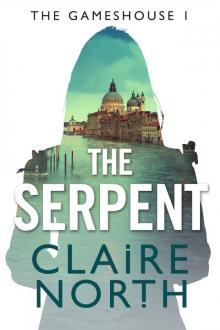 Gamehouse 01 - The Serpent
Gamehouse 01 - The Serpent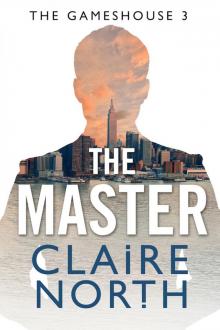 The Master
The Master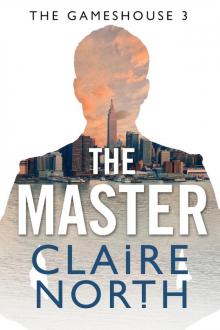 Gamehouse 03 - The Master
Gamehouse 03 - The Master The Thief
The Thief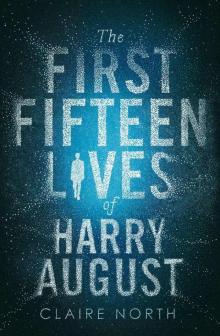 The First Fifteen Lives of Harry August
The First Fifteen Lives of Harry August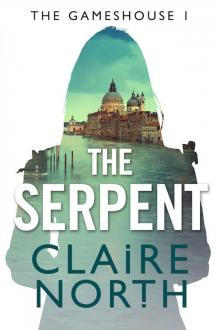 The Serpent
The Serpent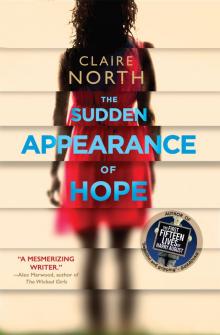 The Sudden Appearance of Hope
The Sudden Appearance of Hope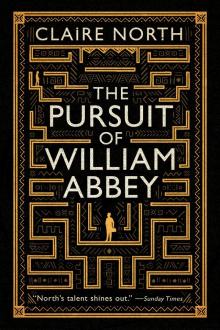 The Pursuit of William Abbey
The Pursuit of William Abbey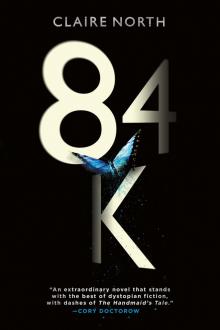 84k
84k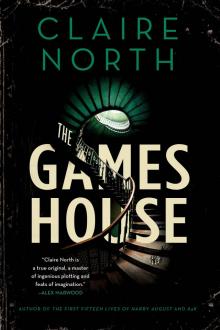 The Gameshouse
The Gameshouse Touch
Touch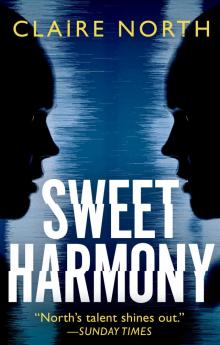 Sweet Harmony
Sweet Harmony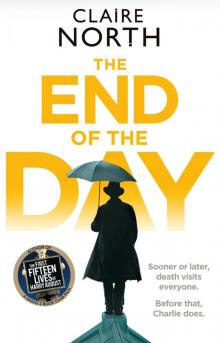 The End of the Day
The End of the Day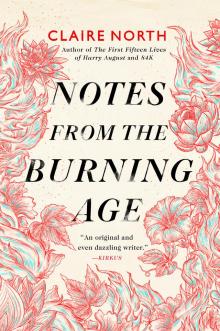 Notes from the Burning Age
Notes from the Burning Age